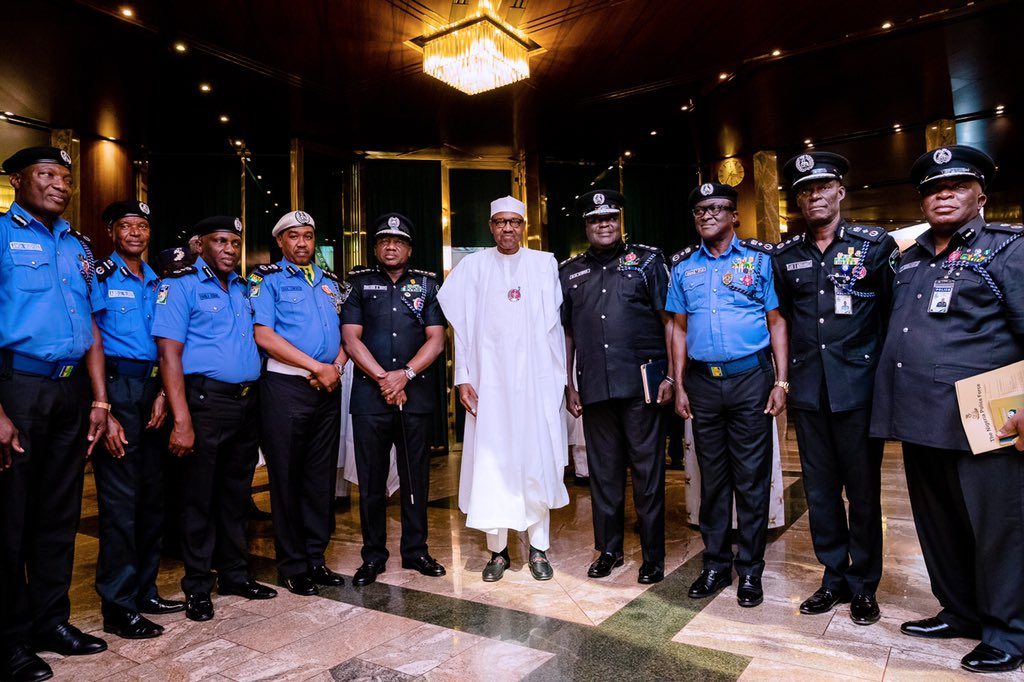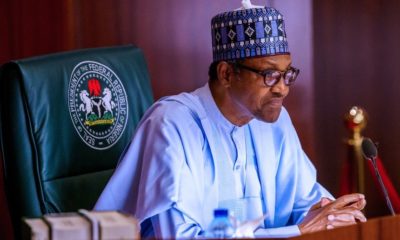- President Okays Salary Increase for Policemen
President Muhammadu Buhari has approved Rank Salary Structure Adjustment for the Nigeria Police Force, the Presidency said on Monday.
The structure implies that the salaries, allowances and pensions of policemen will be increased.
A statement by the Senior Special Assistant to the President on Media and Publicity, Mr Garba Shehu, said the decision was part of the commitment of Buhari’s administration “ to give attention to the welfare and operational needs of the Nigeria Police Force with a view to restoring its lost primacy in the internal security framework of the country.”
The statement said Buhari met with members of the Nigeria Police Service Commission at the Presidential Villa, where he spoke on the inability of the police to perform their primary duties of law enforcement.
He noted that this had necessitated government’s action in drafting the military to the streets often to help maintain law and order in situations that the police could have handled ordinarily.
“From Taraba to Sokoto to the South-South, people don’t feel secure until they see the military.
“I am pleased to make the increase in salaries and allowances in the hope that will increase the performance index of the police and strengthen Nigeria’s internal security system,” the President announced.
The President called for more efficient policing of the country to raise the confidence of both the government and Nigerians.
He explained that this would allow the military to be restricted to its core mandate of protecting the territorial integrity of the country.
The statement quoted Buhari further, “The military should be reserved for higher tasks.
“The police should be able to cope well with the challenges of armed robbery, kidnapping for ransom and such crimes. In every town and village, there is the presence of the police.
“From all these places, they should be able to forward first class intelligence to you on which to act.
He added, “There is a need to amplify the question of more men of the police, especially given the condition we are in – emergency in the North-East, pervasive insecurity and abduction for ransom and banditry in many parts of the country.
“I congratulate you on the success you recorded against criminals taxing people and stopping them from their farms. We are expecting more from you.”
The PSC members were led on the visit by a Commissioner on the commission, Justice Clara Ogunbiyi (retd), who represented the Chairman, Musiliu Smith.
New salary for police won’t restore Nigerians’ confidence in Buhari – PDP
Meanwhile, the Peoples Democratic Party has said the new salary structure announced by President Muhammadu Buhari for the police will not restore Nigerians’ confidence in the Federal Government and the President.
It however described the action as a welcome development.
Nevetheness, the main opposition party asked Nigerians to pray that the Buhari Presidency would be able to fulfil the promise.
National Publicity Secretary of the party, Mr Kola Ologbondiyan, who spoke with one of our correspondents on the pronouncement by the President on the increase in the salary of the police, said “asked the police not to jubilate until the President fulfils his promise.”
He said, “The increase in the salary is a welcome development. We are not against it, even though it is coming a few months before the conduct of the general election.
“However, that increment will never confer or restore peoples’ confidence in President Buhari andd his Presidency.
“It is a battered government of deceit that has lost the morality to lead. Let’s us pray that the Buhari Presidency will fulfil the promise. If that is the only promise it will fulfil before it leaves office next year, let us pray it is able to do that. Nigerians should also pray that the President will not renege on the promise, or even said a committee be set up later to discuss it in order for it to buy time.”
Ologbondiyan asked Nigerians to mount pressure on the President to fulfil the “self-imposed promise so that it doesn’t go the way of other campaign promises.”
Buhari may be playing political card – Civil society
Two civil society organisations – the Campaign for Democracy and the Centre for Anti-Corruption and Open Leadership – have said that President Buhari’s decision to review the police’s salary scale structure is a welcome development but may be a political card ahead of the 2019 general election.
The CD President, Usman Abdul, said the President had in the last three years not acted in that direction, noting that the Nigeria Labour Congress issues still had not been fully resolved.
Abdul said, “If the Federal Government is attending to the police, it should remember that the Nigeria Labour Congress had been on its neck for some time but nothing concrete has been done yet. If the President has just received the police commission and promised to review their salaries, I believe it is a good development but we at the civil society are mindful of the timing of such gestures.
“Let no one be overjoyed until we see the conduct of the police in 2019. These are political seasons and the President may be playing a political card. We hope the police will not be used to act against our democratic ideals.”
Also the CACOL Director, Debo Adeniran, said, “It is a right step in the right direction but one would not know the mindset of the President. It is better late than never. It may not be a political card and it may be. But we know that police deserve a better living. If you like, I would have said that the government knows how to take care of citizens only at election times, maybe elections should come every now and then.”

 Naira4 weeks ago
Naira4 weeks ago
 Naira3 weeks ago
Naira3 weeks ago


 Naira4 weeks ago
Naira4 weeks ago




 Naira2 weeks ago
Naira2 weeks ago
 Commodities4 weeks ago
Commodities4 weeks ago


 News3 weeks ago
News3 weeks ago


 Sport Business4 weeks ago
Sport Business4 weeks ago


 Banking Sector4 weeks ago
Banking Sector4 weeks ago






















